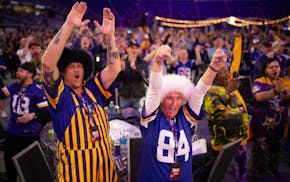AX 3 DOMAINES, France — At his first real opportunity, Chris Froome blew away his main Tour de France rivals with a supersonic burst Saturday, a fierce uphill climb that felt a little like the bad old days of Lance Armstrong.
But the Briton who took the race leader's yellow jersey, and looks more likely than ever to keep it all the way to the finish in Paris on July 21, insisted there are fundamental differences between then and now.
Armstrong was stripped of seven Tour titles last year for serial doping. Froome promised that his achievements won't need to be erased in the future.
"It is a bit of a personal mission to show that the sport has changed," Froome said. "I certainly know that the results I'm getting, they're not going to be stripped — 10, 20 years down the line. Rest assured, that's not going to happen."
Froome hasn't come out of nowhere. The 28-year-old was the Tour runner-up last year to teammate Bradley Wiggins, runner-up at the Tour of Spain in 2011 and has been the dominant rider this year coming into the Tour.
Drug testing in cycling is also better and more credible than it was when Armstrong and his U.S. Postal Service teammates were pumping themselves with hormones, blood transfusions and other banned performance-enhancers.
While improved doping controls do not guarantee that the 198 riders who started the Tour on June 29 are competing clean, they do allow Froome's generation to argue more convincingly that they are a different and more believable breed of competitors from those who doped systematically in the 1990s and 2000s.
"It's normal that people ask questions in cycling, given the history of the sport. That's an unfortunate position we find ourselves in at the moment, that eyebrows are going to be raised, questions are going to be asked about our performances," Froome said.
"But I know the sport's changed. There's absolutely no way I'd be able to get these results if the sport hadn't changed. I mean, if you look at it logically we know that the sport's in a better place now than it was, has been, ever, I think, for the last 20, 30 years."
Still, the hammer-blow Froome delivered on the first stage at this Tour to finish in the high mountains and the way his Team Sky support riders exhausted his rivals by riding hard at the front made it almost impossible to not think of Armstrong.
At the Tours of 1999, 2001 and 2002, Armstrong also used the first high mountain stage to put a grip on the race. A favored tactic for his Postal team — the so-called Blue Train — was to ride so hard at the front that rivals would eventually peel off, spent, leaving Armstrong to then reap victory.
"Any results now, they're definitely a lot more credible," Froome said. "The questions should be asked about people who were winning races maybe five, 10 years ago when we know that doping was more prevalent."
"Anyone who actually spends a bit of time with the team, with us, building up to an event like this, I mean this is months and months of preparation that's gone into this," he added. "That work equals these results, and it's not something that's so, 'Wow. That's unbelievable.' It actually does add up if you look to see what actually goes into this."
There is a racing logic to why Froome and Sky wanted to impose themselves right from the outset in the Pyrenees. The time gaps they opened on Froome's rivals will allow Sky to better manage the race. They won't have to keep such a careful eye on riders who have been all but eliminated from the running for overall victory. The racing — so frantic, nervous and crash-prone in the first week of the Tour — should now calm down somewhat, with Sky expected to marshal the front of the pack to protect its yellow-jersey wearer.
Peter Kennaugh, Froome's teammate, said Sky can "take a lot of control of the race and do it how we want to do it."
Nicolas Portal, a Sky director, said the time advantages they banked on the climb up to the Ax 3 Domaines ski station would act as a safety cushion for Froome.
"We don't know what could happen in five or six days. Chris could get sick, have a bad stage, so these seconds are very important," he said.
In fact, it was more minutes than seconds.
Andy Schleck, the 2010 winner, rode in 3:34 after Froome. The 2011 victor, Cadel Evans, was 4:13 behind. Two-time champion Alberto Contador lost 1:45 to Froome. The gaps were so large that, already, it seems only a mishap can prevent Froome from winning.
"The Tour de France is over, it's finished," said Marc Madiot, manager of the FDJ.FR team. "We'll have battles every day for stage wins but the question about who will win the Tour is done."
Closest to Froome was teammate Richie Porte, who came in 51 seconds back. That sets up the prospect of a second consecutive one-two finish in Paris for Sky.
"More than anything today we've got a bit of a psychological advantage over the others," Froome said. "It's a long way to being decided. We're going to have to fight for this."
Bevy of defensive playmakers are available in Round 2 of the NFL draft after historic offensive run
Twins bring momentum on road despite Angels Stadium struggles

Neal: McCarthy mania sweeps through Vikings draft party

Pretty much a must-win Game 3 for Suns as series moves to Phoenix

